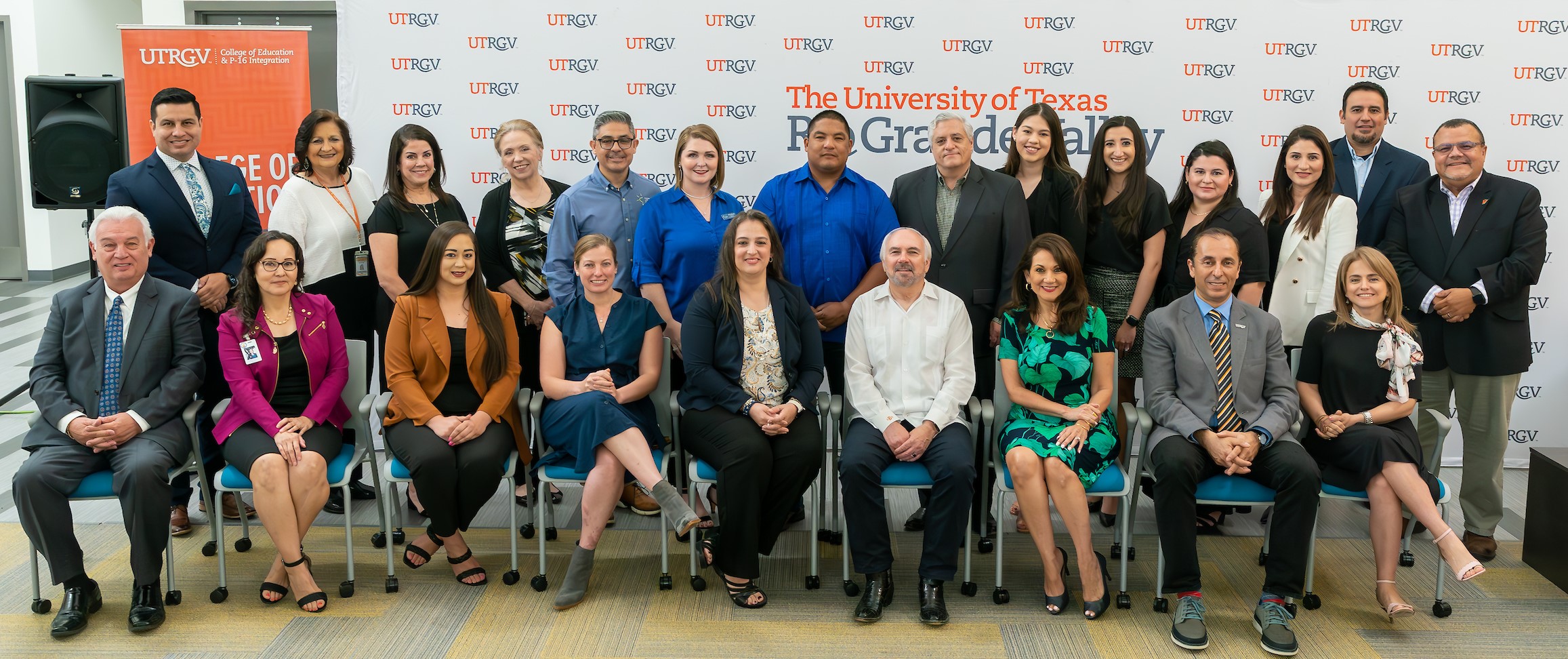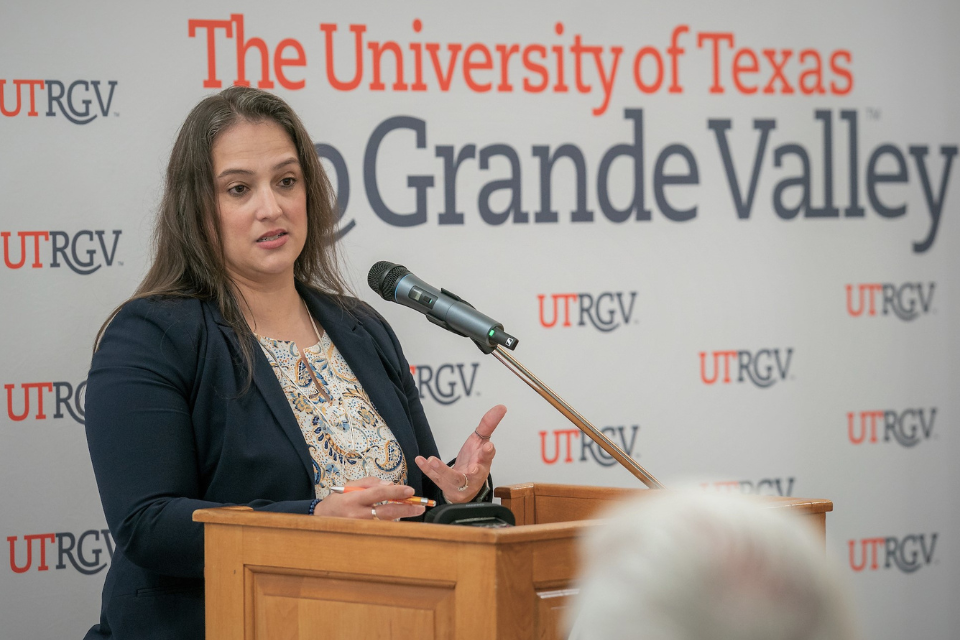By Karen Villarreal
RIO GRANDE VALLEY, TEXAS – MAY 16, 2023 – A UTRGV project that trains graduate students to address the shortage of mental health service professionals in K-12 schools continues to grow in the Rio Grande Valley.
On Tuesday, May 16, UTRGV held a joint press conference with partnering education agencies to announce the launch of two $5M expansions to a grant that provides direct intervention to K-12 students, and fortifies the infrastructure for in-school referrals when additional intervention is needed.
Dr. Nancy P. Razo, LSSP, professor of practice and School Psychology program coordinator, was awarded the initial $5.7 million Mental Health Services (MHS) ACCESS grant in January 2023 – a five-year plan that contributes to a nationwide initiative to increase access to school-based mental health services.
The grant places graduate students from UTRGV’s school psychology, counseling and social work programs to train in-practice over the next five years in partnered districts.
Razo said the students will be trained to provide counseling, threat assessments, parent intervention, and referrals for additional support, such as to TCHATT.
With the two recently awarded expansions – “Mental Health Services Demonstration Grant Program (MHS DGP)” and “MHS ACCESS 2” – the university will train a total of 250 graduate students over the next five years to practice in 12 partnering education agencies.
“We have amazing local education partners who have welcomed our project with open arms to support their students. It is a win-win all around,” Razo said.
UTRGV President Guy Bailey said the schools involved are fully invested in the endeavor.
“We’re very proud to be working with our partners to solve a problem as complex as mental health,” Bailey said. “All of us together will make a difference.”
VALLEY SCHOOL PARTNERSHIPS
- The initial $5.7 million MHS ACCESS, awarded in January 2023, will train 120 future mental health professionals in six school districts: Edcouch-Elsa, McAllen, PSJA, Sharyland, Harlingen and Mission.
- The new $5.8 million MHS DGP grant, awarded in March 2023, is expected to train another 60 graduate students over the next five years in IDEA Public Schools and the South Texas ISD.
- Simultaneously awarded in March with the MHS DGP grant, the $5.6 million MHS ACCESS 2 grant will place 14 students-in-training per year in four school districts: Laredo, United, Mercedes and Valley View.
“There are so many events in the lives of children that are affecting their mental health,” Razo said. “My team and I, as well as our graduate students, are ready to provide them with necessary mental health services in their schools. We want to address those events, in hopes that our children can thrive academically, socially and emotionally.”
PREVENTATIVE INTERVENTION
Dr. Noe Ramos, assistant professor in the Department of Human Development and School Services, was awarded the $5.8 million MHS DGP expansion in March 2023.
Working with non-traditional districts like IDEA charter schools and the magnet schools of the South Texas Independent School District is an opportunity to collaboratively expand on existing services and find what works best for their students, Ramos said.
Each partnering agency will participate in shaping their mental health program through advisory boards.
“What’s important is helping the kids,” said Ramos, who also serves as co-PI on the two grants announced to the public on Tuesday. “Our goal is to change how kids are supported and catch them on the front end.”
Razo, co-PI on MHS DGP, said the hope is that training diverse mental health professionals to work with diverse populations will have long-term impact.
“If kids are mentally healthy, they won’t need special education programs,” she said. “We can start intervening before they show behavioral issues and prevent the school-to-prison pipeline.”
SERVING HIGH-NEED AREAS
Razo said the partnering schools were selected because they showed high need, which is high statewide, as well.
“All districts in the Rio Grande Valley are all hurting for school-based mental health professionals,” Razo said.
While the recommended number of students to Licensed Specialist in School Psychology (LSSP) is 500:1, statewide and locally, districts are not close to meeting that need.
- In Texas, the ratio for students to LSSP in the 2020-21 school year was 2,662:1.
- In Region One, where many of the Valley’s partnering schools are located, the ratio was 3,752:1.
Similarly, schools in Texas do not meet the recommended 250:1 ratio for students to counselors. In Texas, the ratio in the 20-21 school year was 395 students per counselor; in Region One, each counselor serves 343 students.
Social workers are also recommended in schools – one per 250 students, and one per 50 students if there’s a special needs population, including English-as-a-Second-Language learners.
“Some schools don’t have a social worker at all,” Razo said.
- Texas’s average ratio of students to social workers is 5,278:1.
- In Region one, the ratio is 2,859 students to each social worker.
Dr. Luis Torres-Hostos, dean of the UTRGV School of Social Work, said the program’s students will provide services, work with families, and bring social justice concerns to the conversation.
Social work students take a holistic approach, he said, addressing social determinants of health, like housing and food security.
“These grants are truly transformative,” Torres-Hostos said.
HOME-GROWN HEALTHCARE
Dr. Can “John” Saygin, senior vice president for Research and dean of the Graduate College at UTRGV, said the investment in training and hiring mental health professionals across the Valley will help mitigate the negative impacts of mental health issues on academic, social and emotional development for area youths.
"Given the significant mental health challenges faced by youth, strengthening school-based mental health services is a top priority for UTRGV," Saygin said.
Faculty from the UTRGV Department of Counseling and School of Social Work are contributing to the newly funded projects, which will launch in April 2023. These include Dr. Suzanne Maniss, Dr. Jessica Haas, Nelda M. Rodriguez, LMSW, Dr. Javier Cavazos, LPC, Dr. Denise Longoria, LCSW-S, and Dr. Selma Yznaga, LPC.
Razo said the triad model of school psychology, counseling and social work working together
is beneficial for school-age students and the community at large, as well as for graduate students who want to serve in the area they call home.
“Many of our graduate students are from the Rio Grande Valley and want to stay and work in the region as mental health professionals,” Razo said. “Unfortunately, positions have not been available for them to do their work here, so they’ve had to leave. For the next five years, though, these positions will be guaranteed for them.”
The graduate students and field-based supervisors will be paid a stipend over the course of their service, and will be equipped with tablets and professional development training.
"We hope that school districts will be able to create positions and employ our students as licensed professionals once they graduate, so they can continue to help improving the mental health of K-12 students,” Razo said.
The UTRGV graduate students will be placed in partnering schools in August to start working with K-12 students in the Fall 2023 school year.
ABOUT UTRGV
The University of Texas Rio Grande Valley (UTRGV) was created by the Texas Legislature in 2013 as the first major public university of the 21st century in Texas. This transformative initiative provided the opportunity to expand educational opportunities in the Rio Grande Valley, including a new School of Medicine and a School of Podiatry, and made it possible for residents of the region to benefit from the Permanent University Fund – a public endowment contributing support to the University of Texas System and other institutions.
UTRGV has campuses and off-campus research and teaching sites throughout the Rio Grande Valley including Brownsville (formerly The University of Texas at Brownsville campus), Edinburg (formerly The University of Texas-Pan American campus), Harlingen, Weslaco, McAllen, Port Isabel, Rio Grande City and South Padre Island. UTRGV, a comprehensive academic institution, enrolled its first class in the fall of 2015; the School of Medicine welcomed its first class in the summer of 2016, and the School of Podiatric Medicine in the fall of 2022.


